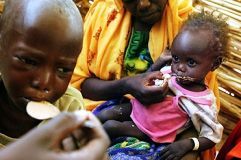Sudan to provide free healthcare for under-fives
January 21, 2008 (KHARTOUM) — Rising oil revenues mean Sudan will give free healthcare to children under five and waive fees for caesarean sections from Feb. 1 in a move that will cost $20 million a year, a senior health official said on Monday.
 “After decades of north-south civil war ended in 2005, oil revenues have increased and the economy has boomed despite conflict in Darfur.
“After decades of north-south civil war ended in 2005, oil revenues have increased and the economy has boomed despite conflict in Darfur.
“This is a long-term plan to make all medication, treatment and investigations free … for this vulnerable group of children under five,” health ministry under-secretary Kamal Abdel Gadir told Reuters.
Many in Sudan complain that three years on they have seen little peace dividend and even less of the oil revenues Sudan receives from its output of more than half a million barrels per day. The move will help thousands of families who struggle, beg and borrow to pay for expensive healthcare.
The policy will also apply to emergency and elective caesarean sections, which costs on average $50 in government hospitals.
According to the World Bank, per capita income in Sudan is $650 year.
Abdel Gadir said the money would come from the central health budget and arose from the increase in oil revenues following the 2005 peace deal.
“We need to bear the burden of the citizens on contributing to their services,” he said, adding that new hospitals were being built and existing ones were being renovated.
In Khartoum local and central government taxes are heavy and services such as electricity, healthcare and water are expensive for Sudanese.
The reforms began in part last year when emergency caesarean operations were made free. Health Minister Tabitha Botros from the former southern rebel Sudan People’s Liberation Movement (SPLM), appointed after the deal, was previously a nurse in Britain’s free National Health Service.
The SPLM pledged to provide services for Sudanese after the war although south Sudan has seen slow progress.
Millions in Sudan’s west and south still depend on foreign aid as the nation struggles to emerge from decades of conflict.
(Reuters)
